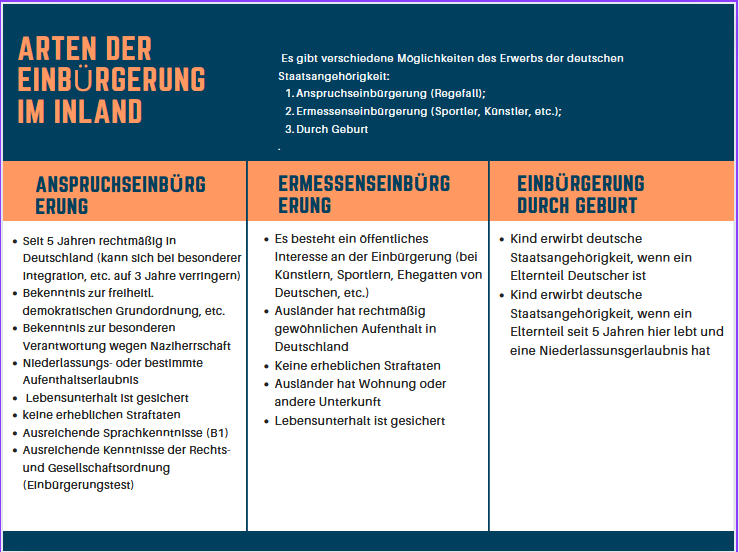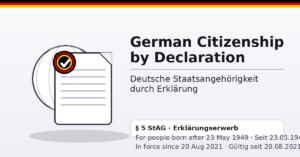Federal Administrative Court, June 1, 2017, Case No.: 1 C 16.16
Section 10 of the Nationality Act (Entitlement to Naturalization) includes the following requirements:
-
-
- Five years of lawful permanent residence in Germany, which must generally be continuous.
- The applicant’s commitment to the free and democratic constitutional order.
- The applicant must hold a right of residence (e.g., residence permit or settlement permit).
- The applicant must be able to support themselves and their dependents without relying on social welfare.
- The applicant must have no criminal record.
- Sufficient knowledge of the German language.
- Knowledge of the German social order.
-
The issue at hand is whether an applicant for naturalization who obtained their residence permit through fraudulent misrepresentation meets the time requirements for naturalization. This question was addressed in the case initially by the Administrative Court, in the appeal process by the Higher Administrative Court, and finally in the revision process by the Federal Administrative Court.

Note: This case was assessed according to the Nationality Act (StAG) before the 2024 amendments.
Background and Entry of the PlaintiffBackground and Entry of the Plaintiff
The plaintiff, an Iraqi national, entered Germany in 1997 under a false identity. He claimed to be from central Iraq and applied for asylum. In a court proceeding, he was eventually granted refugee status and protection from deportation, as the court determined that he would face political persecution and degrading treatment if returned to Iraq. The court also ruled that, as a Kurd, the plaintiff could not be referred to northern Iraq as a safe alternative. These findings led to the granting of a residence permit in Germany.
In March 2008, the plaintiff received a settlement permit under Section 26, Paragraph 4 of the Residence Act (AufenthG). Two years later, in May 2010, he presented an Iraqi nationality certificate to the immigration authorities and requested a correction of his personal information, which was granted. This revealed his true identity, which had remained unknown until that point.
Application for Naturalization and Rejection by the Authorities
In October 2012, the applicant applied for naturalisation in Germany. In this application, he explained that he had lived in his birthplace in northern Iraq before leaving Iraq and had married there in 2000. At the request of the naturalisation authority, the Federal Office for Migration and Refugees (BAMF) stated in June 2013 that there were no prerequisites for revoking or withdrawing the benefits under asylum law. Despite this information, the competent authority rejected the applicant's application for naturalisation on 20 November 2013. The reason given was that the applicant did not meet the requirements for naturalisation in accordance with Section 10 of the German Citizenship Act (StAG). Specifically, he was accused of not having been legally resident in Germany for eight years due to the identity deception (at the time of the decision, eight years and not five years were still required for naturalisation).
Legal Disputes: Lawsuit, Appeal, and Revision
The plaintiff filed a lawsuit against the decision in the Administrative Court, which was dismissed on January 14, 2015. He then appealed, which was also dismissed. The Higher Administrative Court confirmed the decision of the first instance in its ruling of April 20, 2016, stating that the plaintiff could not establish lawful residence in Germany before revealing his true identity in 2010. The court argued that the plaintiff’s stay until that point was based on deception, and he could have been expelled at any time. Therefore, the period before 2010 could not be counted towards the required eight years. The plaintiff then filed a revision with the Federal Administrative Court.
Decision of the Federal Administrative Court
The Federal Administrative Court ruled in favor of the plaintiff, finding that the revision was successful. The court determined that the plaintiff met the requirements for naturalization under Section 10 StAG, as he had lawfully resided in Germany for eight years. The assumption of the appeal court that the plaintiff could not establish lawful residence before disclosing his identity was found to be contrary to federal law.
The court clarified that the current legal situation is decisive for assessing the naturalization claim. Under Section 10, Paragraph 1, Sentence 1 of the StAG, a foreigner who has lawfully resided in Germany for eight years must be naturalized upon application if they meet the other requirements and there is no reason for exclusion. The main question in this case was whether the plaintiff, despite the initial identity deception, had lawfully lived in Germany for eight years.
Assessment of Lawful Residence and Regular Stay
The Federal Administrative Court noted that the term „regular residence“ in the Nationality Act is aligned with the legal definition in Section 30, Paragraph 3, Sentence 2 of the Social Code Book I (SGB I). A foreigner has a regular residence in Germany if they live there not just temporarily but for an indefinite period. The decisive factor is that their center of life is in Germany. This prognosis requires more than mere presence and does not exclude the possibility of temporary stay or the absence of measures by the immigration authorities to terminate the stay.
According to the court, the plaintiff’s stay before 2010, although based on deception, could still be considered regular residence. The mere vulnerability of a residence title obtained through deception does not preclude the recognition of regular residence. The court emphasized that it is crucial to consider how the immigration authorities would have hypothetically reacted if they had known about the deception. This hypothetical prognosis is meant to ensure that the plaintiff does not gain an unfair advantage from the deception.
Conclusion: Lawfulness and Entitlement to Naturalization
The Federal Administrative Court further concluded that the plaintiff also met the requirement of „lawfulness“ of his residence. This lawfulness refers to the possession of a valid residence title, which is considered lawful even if obtained through deception, as long as it has not been revoked or withdrawn. Since the plaintiff’s settlement permit was granted in March 2008 and had not been revoked, his stay was lawful.
The court emphasized that the outcome does not conflict with the case law of the Federal Constitutional Court, which holds that the revocation of fraudulently obtained naturalization is necessary to assert the law. It is not mandatory that every position obtained through deception must be reversed, as long as the effectiveness of the legal order is not undermined. Ultimately, the court ruled that the plaintiff met all the requirements for naturalization and therefore had a right to be naturalized.
Source: Federal Administrative Court
Important Note: The content of this article has been prepared to the best of our knowledge and belief. However, due to the complexity and constant evolution of the subject matter, we must exclude liability and warranty. Important Notice: The content of this article has been created to the best of our knowledge and understanding. However, due to the complexity and constant changes in the subject matter, we must exclude any liability and warranty.
If you need legal advice, please feel free to call us at 0221 - 80187670 or send us an email to info@mth-partner.de
Lawyers in Cologne advise and represent clients nationwide in immigration law.




